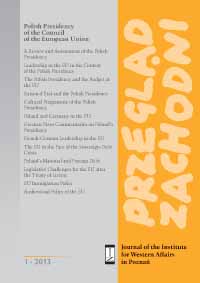Audiovisual Policy of the European Union
Audiovisual Policy of the European Union
Author(s): Jędrzej SkrzypczakSubject(s): Politics / Political Sciences
Published by: Instytut Zachodni im. Zygmunta Wojciechowskiego
Summary/Abstract: The article provides a provisional systematisation of EU policy on mass media. The approach of the European Communities to the issue of mass media in the last decades can be divided into several stages. In the initial period, relatively the longest one, EC bodies were denied competences to interfere in this area. The 1980s and 1990s were characterised by an attempt on the part of the EU to work out adequate and distinct strategies regarding mass media. The moment the EC bodies ‘‘gained’’ the competences to regulate the principles underlying the functioning of the media, a boisterous development of the EU media law started and became especially conspicuous with the emergence of global media. Regulations on mass media initially pertained to television but then expanded onto audiovisual media services followed by a growing significance of the so-called ‘‘new media’’. EU policy deals with the media in three different contexts: firstly, in the context of competition policy and principles governing the functioning of the internal market; secondly as an element of democratic and cultural infrastructure; and thirdly, on the level of building the so-called information society. A hypothesis is put forward that the EU audiovisual policy is dominated by a two track strategy of regulating the functioning of the media.
Journal: Przegląd Zachodni
- Issue Year: 349/2013
- Issue No: I ENG
- Page Range: 227-240
- Page Count: 14
- Language: English

